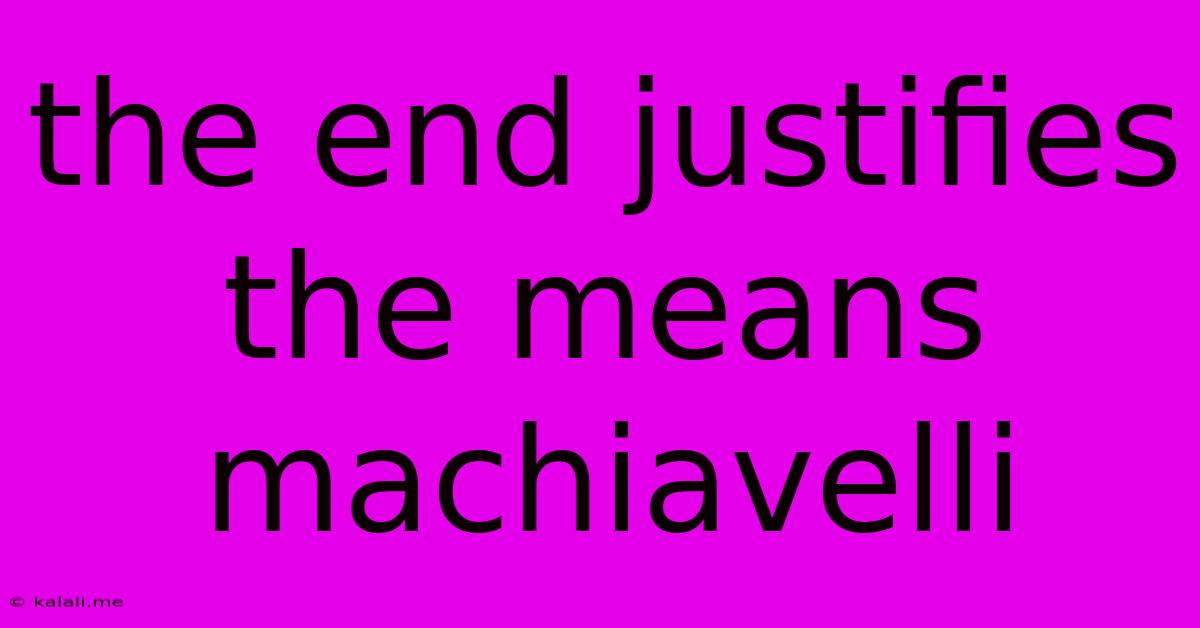The End Justifies The Means Machiavelli
Kalali
May 25, 2025 · 3 min read

Table of Contents
The End Justifies the Means: A Machiavellian Examination
Meta Description: Explore Niccolò Machiavelli's controversial principle that "the end justifies the means," examining its implications for leadership, morality, and political strategy. Uncover the nuances of this philosophy and its enduring relevance in modern contexts.
Niccolò Machiavelli, the 16th-century Florentine diplomat and writer, remains a controversial figure. His masterpiece, The Prince, is often cited as the seminal text on political pragmatism, largely due to its unflinching exploration of the idea that "the end justifies the means." This seemingly straightforward principle, however, is far more complex and nuanced than a simple justification of amorality. This article will delve into the depths of Machiavellian thought, exploring the implications of this philosophy and its continued relevance in the modern world.
Understanding Machiavelli's Pragmatism
Before dissecting the infamous phrase, it's crucial to understand Machiavelli's context. Writing during a turbulent period in Italian history, characterized by shifting alliances, brutal power struggles, and constant warfare, he observed that traditional morality often proved inadequate in the face of ruthless political realities. He wasn't advocating for outright wickedness, but rather suggesting that a ruler, in pursuit of stability and the overall good of the state (however defined), might need to employ strategies deemed morally questionable by conventional standards.
This isn't to say that Machiavelli condoned arbitrary cruelty. His analysis is acutely perceptive of the human condition, acknowledging the limitations of idealism in the face of powerful self-interest. He argued that a leader should be prepared to act decisively, even if it meant sacrificing ethical niceties, to achieve vital objectives – securing power, maintaining order, or defending the state.
The Nuances of "The End Justifies the Means"
The phrase itself is often misinterpreted as a blanket justification for any action, regardless of its brutality. However, Machiavelli's argument is more subtle. He emphasizes the importance of the end goal – the ultimate well-being and stability of the state. The "means" employed should be carefully considered, weighed against their potential consequences, and only used as a last resort when absolutely necessary for achieving that overriding objective.
This necessitates a shrewd understanding of human nature, the political landscape, and the potential repercussions of any action. A successful leader, in Machiavelli's view, isn't simply ruthless; they're also cunning, adaptable, and able to discern when to employ force and when to negotiate. They are masters of strategic calculation, constantly weighing the costs and benefits of different courses of action.
Criticisms and Counterarguments
Machiavelli's ideas have been relentlessly scrutinized for centuries. Critics rightly point to the potential for abuse; the lack of clear moral boundaries can easily lead to tyranny and oppression. The risk of a slippery slope, where justifying one questionable action opens the door to countless others, is a valid concern. Moreover, the definition of "the overall good" remains subjective and open to manipulation. What one ruler deems beneficial, another might consider detrimental.
Furthermore, the long-term consequences of morally dubious actions are often unforeseen. Even if a leader achieves a short-term victory through questionable means, the resulting damage to reputation, trust, and societal fabric could far outweigh any perceived benefit.
Modern Interpretations and Relevance
Despite the criticisms, Machiavelli's insights continue to resonate in modern political discourse. The complexities of international relations, economic policy, and even corporate strategy often necessitate difficult choices, requiring leaders to navigate morally ambiguous situations. While few would openly endorse a complete disregard for ethics, the core idea of strategic calculation and prioritizing long-term goals remains relevant.
The key takeaway isn't to embrace amorality, but to acknowledge the inherent challenges of leadership and the need for careful consideration of all factors – ethical, practical, and political – when making crucial decisions. A nuanced understanding of Machiavelli's work allows for a more realistic and effective approach to leadership, acknowledging the tensions between idealism and pragmatic necessity. It encourages a deeper examination of the intended consequences of actions and a more critical evaluation of the long-term effects of seemingly expedient choices. This careful consideration, rather than the simplistic adoption of "the end justifies the means," is the true legacy of Niccolò Machiavelli.
Latest Posts
Latest Posts
-
Where Does The Red Brick Road Go Wizard Of Oz
May 25, 2025
-
How To Factor A Cubic Polynomial
May 25, 2025
-
How Long To Wait Before Checking Oil
May 25, 2025
-
How To Number Equations In Latex
May 25, 2025
-
How To Make Hose Water Warm
May 25, 2025
Related Post
Thank you for visiting our website which covers about The End Justifies The Means Machiavelli . We hope the information provided has been useful to you. Feel free to contact us if you have any questions or need further assistance. See you next time and don't miss to bookmark.